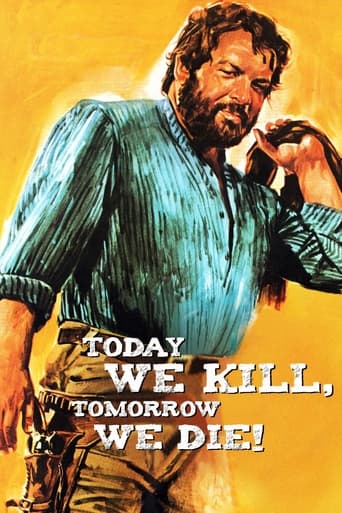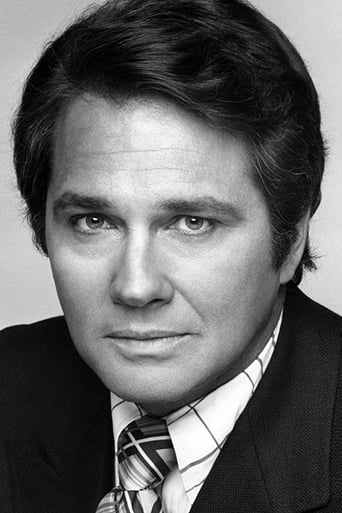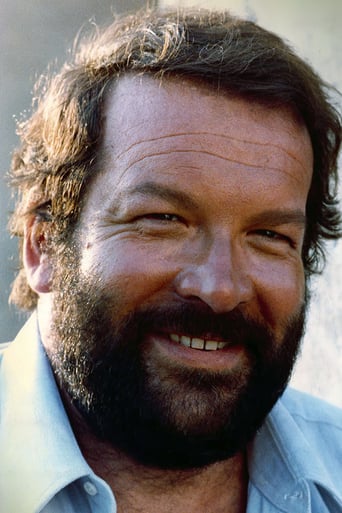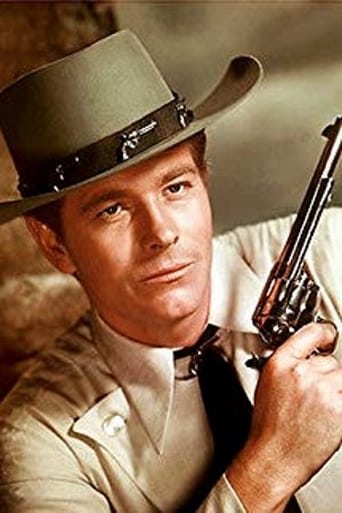

Today We Kill, Tomorrow We Die! (1971)
A man, released after a jail term for a crime he did not commit, raises a gang to go after the man who framed him.
Watch Trailer
Cast


Reviews
Bill Kiowa (Brett Halsey) practices his pistol-handling everyday in prison, using a carefully carved wooden replica gun. Kiowa was framed, we learn, and up to the very morning of his release, he repeatedly whips the gun up and out of an imaginary holster, hoping to perfect his draw for the one moment he has dreamt of: facing the man who framed him.TODAY... opens as Kiowa gets his release, and the story unfolds with Kiowa rounding up a gang of mercenaries to help track down and confront the man who framed him, James Elfego. (The character's nationality is never mentioned but he is played by the Japanese actor Tatsuya Nakadai. Elfego dresses and acts like the other cowpokes in his gang -- minus a hat -- so the casting might be a lark, or meant to have some deeper subtext.) Kiowa's father gives him a stash of loot to use for paying off the hired guns, and dad is happy to recommend four top-shelf men for the job. Each man is a colorful, distinct personality, and each is played by a legitimate Euro-Western leading man, making the team an all-star squad of sorts. We have Franco "Chet Davis" Borelli, star of DEAD MEN DON'T MAKE SHADOWS, as a clean-cut ladies man; Wayde Preston from BALLAD OF DEATH VALLEY portraying the no-nonsense sheriff; Western stalwart William Berger as a frilled, bejeweled, card-shark; and lastly, the legendary Bud Spencer in full-on "Bambino" mode in the part of a Herculean giant.The first third of the film, wherein Kiowa assembles the gang, is kind of light-hearted, and has a BLUES BROTHERS-esque "let's get the old band back together" feel to it. Despite Halsey's menacing demeanor, the gang is seemingly primed more for a rip-roaring good ol' Western adventure than a fierce, intense showdown with a band of violent savages. Particularly curious is the conceit where Kiowa will meet with a prospective gunman, lay out the terms of the job, and, BANG, we cut to a shot of them riding together side-by-side. So first it is Kiowa alone, then he picks up his first hire and it's two men riding, then another hire and bang, three men riding, etc. Set to the pic's spritely, bouncy, main theme, it's definitely more mirthful than menacing, though hard to determine if that's due to the director's intent or his clumsy touch.Finally, Kiowa's gang set out on their cat-and-mouse chase of Elfego and his gang. Will Kiowa finally get his chance to kill his rival? The story has been given much attention by fans and students of cinema, due to it being an early writing effort of horror film master Dario Argento. But truth told, it is a very ordinary and generic revenge story, one that could have been done by anybody. The interesting aspect of a Japanese man playing the villain is never really addressed within the story itself, so we don't know if it's a "choice" by the writer, or what.Direction by Tonino Cervi is efficient if unremarkable. This film is the only Western on his resume, and its direction is straightforward, and notwithstanding the sepia flashback setpiece, pretty ordinary. The scenery lends a bit of moody and distinctive ambiance to the action, especially in the final showdown sequence, which is set in a lovely, densely-wooded forest. And as mentioned previous, the pic's recurring title music is a little bit too bright and happy to be a good match for the revenge setting of the story. Angelo Lavagnino is the composer. Yet despite the ill fit of the pic, it is a catchy theme.Brett Halsey (billed as Montgomery Ford), an American TV veteran leads the cast as the morose and intense Bill Kiowa. This is the first I've seen of him in a Western, and I am impressed. His style here is straight from the Franco Nero Django school, with bright brooding eyes, stubbly beard, and big over-sized scarf. He is the lone member of the "good guys" that is played straight, that is to say, without a wink or smirk, and he's very good in the part. Wayde Preston is good, bringing a John Wayne-type swagger as the quick-shooting lawman. Bud Spencer is as ever, the wry, sarcastic behemoth of a man, always fighting with his fists rather than engaging in gunplay. (And just an aside, but why does Spencer never wear a hat in any of his roles? Vanity? Who knows.) The standout among Kiowa's men is the delightful William Berger as Colt Moran. His sideways grin and dapper styling are a delight to watch, especially in a scene where he confronts an underhanded poker cheater in a saloon. Toward the film's climax, Berger dispatches a bad guy and betrays no emotion other than to bemoan the blood splatter on his fine, frilly shirt.The villains are led by the evil Elfego, played by Tatsuya Nakadai, a veteran of the Japanese screen including several appearances in Kurosawa pics. His performance here is pretty brilliant, all wide-eyed, intense, and deeply felt. He is a good match for Halsey's low-key, brooding hero. Elfego is dressed like a western gentleman (no hat, though) and packs a big machete in addition to his pair of six-shooters. Was the machete intended to bring to mind a samurai sword? Maybe, but I really wish we had some explanation to his character's origin and backstory. It might have opened up a new level of intrigue to an ordinary plot.It's not an essential eurowestern, but I would call TODAY WE KILl... a solid entry in the genre. Worth seeking out for a standard tale efficiently done, and for fine turns by Halsey, Berger, and especially Tatsuya Nakadai.
It's a pleasure to watch this movie because it's hero has a clear and direct plan, no messing around. Bill Kiowa (Brett Halsey) is released from prison and wants revenge on Elfego (intense villain: Japanese actor Tatsuya Nakadai), the killer of his wife. He looks for the best gunmen he can find (played by William Berger, Bud Spencer, Wayde Preston and Chet Davis), then searches for Elfego and his bandits to challenge them. Simple, but extremely effective. Brett Halsey does an excellent 'silent stranger' job, obviously following the footsteps of 'Django' Franco Nero, also in his outer appearance. The scenes are very well arranged, sarcastic Italian western style at its best. For example, when Bill purchases a gun - without saying a word - then shoots two guys in front of the store, and the owner says what a great gun that is, and he'll order some more of the same type. Professional attitude, isn't it? Another example is when Wayde Preston's character, the sheriff of a town, is joining Bill's team. He simply makes a prisoner new sheriff so he can leave town. So much for law, two sides of the same coin, one might say. Supported by the powerful musical score A.F. Lavagnino composed, 'Oggi a me, domani a te!" is a very recommendable tough flick.
I've always liked Italian westerns and I enjoyed this one as well. Good script by Argento, great music by Lavagnino (who composed the score for such great Italian as Tutti a casa). But let's admit it, there is an evident problem with the casting. Bud Spencer, William Berger and the other dude are O.K. within the limits of the genre, but - oups ! - in the role of the bad guy, they're facing one of the greatest actors of the 20th century, no less. Ladies and gentlemen, Tatsuya Nakadai ! English being only my second language, I am a little bit limited when it comes to finding the right words to describe the work of this phenomenal actor. His fame outside Japan mostly came from a series of outstanding samurai movies such as Hara-Kiri, Sword of doom or Goyokin. (Among many others) Yet all those samurais are remarkably different from one another, for Nakadai's trademark is mercurial versatility. His acting technique sometimes seems so different from one movie to the next that you'd hardly believe it's the same man. And of course he interpreted plenty of other characters besides samurais, such as the unfortunate hero in Kobayashi's monument The Human Condition.I could go on talking about this artist for quite a while. Suffice it to say that watching this western put me somewhat in a sad mood. I'm sure Mr. Nakadai enjoyed himself a lot doing this movie - and it shows ! - but when you have the incredible luck to get such an actor in your cast, frankly it is your responsibility to come out with an outstanding spaghetti western, not just an average-to-good like this one unfortunately is. It's too bad such a project didn't fall in the hands of a more imaginative Italian western director - Sollima or Corbucci or even Colizzi.Yet again, this western is good enough, and is certainly worth watching would it be just for Tatsuya Nakadai alone, playing the villain - and madman - James Elfego with rejoicing maestria. Since the character is in no way a Japanese, Mr. Nakadai does not have his legendary 'sword of doom' with him - but watch your head, for he does have a machete !
Overall, just okay, really, although I will say kudos in particular to Tatsuya Nakadai, who played a great lead villain (he later played the leading role in Kurosawa's "Kagemusha"). What makes him even cooler is that - besides the fact that he wears no hat, nor does Spencer for that matter, Nakadai also wields a wicked machete when things get cooking! Halsey plays an effective lead too, in particular visually - I mean, the dude can grow a good scruff and done a wicked black cloak and hat!The one drawback is the obvious low budget, never more obvious than the fact that - outside of the "good guy" gang and the "bad guy" gang, I think there is like 5 more people in the ENTIRE movie - seriously! The entire third act takes place in a barren forest as the two gangs square off - very weird, really. Kind of like a First Blood thang, with dudes hanging from trees and ambushing guys from the bushes and stuff. I REALLY would have loved to have seen a more seasoned-Argento tackle something like this. The possibilities would have been endless . . .




